- Serbia
Get to know Serbia
- Citizens
Culture and science
Health services
Pension and disability insurance
- Business
Employment
Economy
- Media
- Government
- Contact
Keep in touch
Contact form
Back
Keepin touch
Whether you have a question, comment, suggestion or any problem in the purview of the government, send us your message and we will try to respond as soon as possible. If your problem is not in our purview, we will forward your message to the relevant institution.
Q:
A:
EU must increase its role to help regional development
Belgrade,
1 October 2004
The countries of Southeastern Europe must speed up their integration and forge closer ties within a wider context of European integration so as to move away from Balkanisation and disintegration, according to an international conference on economic development and regional cooperation.
Serbian Deputy Prime Minister Miroljub Labus pointed to slow growth and a high unemployment rate in the region, where, in his view, there is a deep economic depression. He said a new strategy is needed in order to reduce unemployment.
Labus added that the region also needs more foreign investment and that the private sector is no longer sufficient, adding that the European Union should take up a greater role.
He also called for better coordination of international efforts to help regional development, since he said many initiatives are overlapping.
Labus pointed out that growth-oriented investment is being hindered by political bickering and red tape. As an example, he said that the city of Belgrade received €40 million from the European Bank for Reconstruction and Development (EBRD) one year late because it took that much time for the parliament of Serbia-Montenegro to ratify the agreement on this favorable loan.
Coordinator of Southeastern Europe Stability Pact Erhard Busek said there is a number of projects whose implementation should facilitate regional integration. Around €16 billion have been earmarked for development of railway transport alone, he said, adding that transport infrastructure is essential for the region to become a stable and comfortable economic environment and attract external investment.
Busek said illegal trade and shadow economy are still hard to suppress and he warned that regional free trade agreements are not functioning so well in practice.
The two-day conference in Belgrade was organised by the Vienna-based Institute of International Economic Studies. Among those attending the conference are Croatian Minister of European Integration Kolinda Grabar-Kitarovic, Macedonian Ambassador to Serbia-Montenegro Viktor Dimovski, Professor Mojmir Mrak of the Ljubljana University, and Vladimir Gligorov of the Vienna institute.
Labus added that the region also needs more foreign investment and that the private sector is no longer sufficient, adding that the European Union should take up a greater role.
He also called for better coordination of international efforts to help regional development, since he said many initiatives are overlapping.
Labus pointed out that growth-oriented investment is being hindered by political bickering and red tape. As an example, he said that the city of Belgrade received €40 million from the European Bank for Reconstruction and Development (EBRD) one year late because it took that much time for the parliament of Serbia-Montenegro to ratify the agreement on this favorable loan.
Coordinator of Southeastern Europe Stability Pact Erhard Busek said there is a number of projects whose implementation should facilitate regional integration. Around €16 billion have been earmarked for development of railway transport alone, he said, adding that transport infrastructure is essential for the region to become a stable and comfortable economic environment and attract external investment.
Busek said illegal trade and shadow economy are still hard to suppress and he warned that regional free trade agreements are not functioning so well in practice.
The two-day conference in Belgrade was organised by the Vienna-based Institute of International Economic Studies. Among those attending the conference are Croatian Minister of European Integration Kolinda Grabar-Kitarovic, Macedonian Ambassador to Serbia-Montenegro Viktor Dimovski, Professor Mojmir Mrak of the Ljubljana University, and Vladimir Gligorov of the Vienna institute.
-
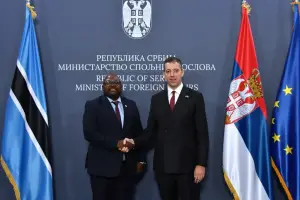 Belgrade, 21 November 2025
Belgrade, 21 November 2025Joint commitment to strengthen bilateral ties between Serbia, Botswana
-
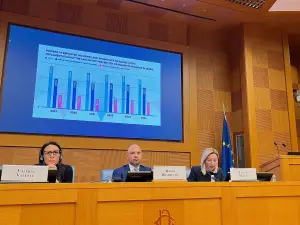 Belgrade/Rome, 21 November 2025
Belgrade/Rome, 21 November 2025Serbian government’s strong commitment to combating violence against women
-
 Belgrade, 18 November 2025
Belgrade, 18 November 2025Serbia remains committed to open dialogue, cooperation with OSCE
-
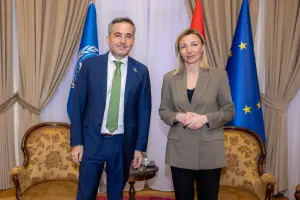 Belgrade, 18 November 2025
Belgrade, 18 November 2025Cooperation with WHO to strengthen protection for victims of violence
-
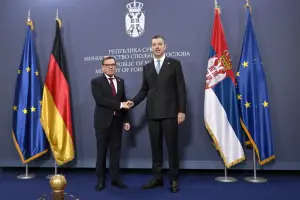 Belgrade, 18 November 2025
Belgrade, 18 November 2025Germany ready to accompany Serbia on its path towards EU
-
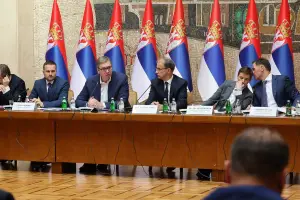 Belgrade, 16 November 2025
Belgrade, 16 November 2025Solution for NIS must be found by next week
-
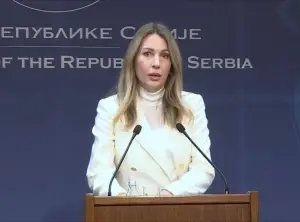 Belgrade, 15 November 2025
Belgrade, 15 November 2025United States sends request for Russian ownership to exit NIS
-
 Belgrade, 13 November 2025
Belgrade, 13 November 2025Serbia continues to be reliable partner of EU
-
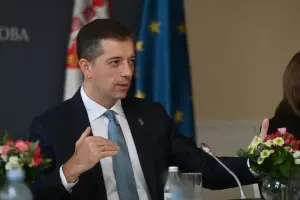 Belgrade, 13 November 2025
Belgrade, 13 November 2025European integration, preserving peace, stability priorities for Serbia
-
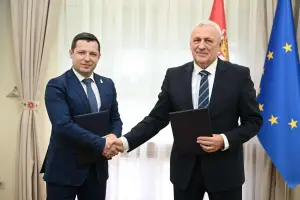 Belgrade, 13 November 2025
Belgrade, 13 November 2025Cooperation agreement signed for preparation of Specialised Expo 2027
